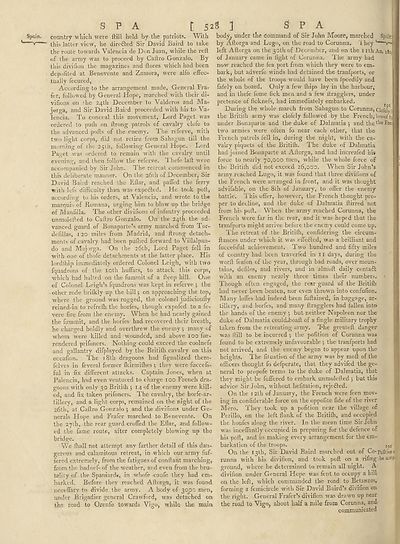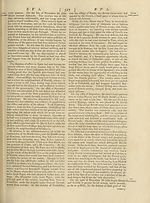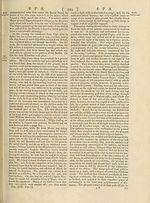Encyclopaedia Britannica, or, a Dictionary of arts, sciences, and miscellaneous literature : enlarged and improved. Illustrated with nearly six hundred engravings > Volume 19, Scripture-SUG
(576) Page 528
Download files
Complete book:
Individual page:
Thumbnail gallery: Grid view | List view

SPA f 52
Spain. country winch were ftill held by the patriots. With
this latter view, he directed Sir David Baird to take
the route towards Valencia dc Dun Juan, while the reft
of the army was to proceed by Caftro Gonzalo. By
this divifion the magazines and ftores which had been
depoiited at Benevente and Zamora, were alfo effec¬
tually fecured,
According to the arrangement made, General Fra-
fer, followed by General Hope, marched with their di-
vifions on The 24th December to Valderos and Ma-
jorga, and Sir David Baird proceeded with his to Va¬
lencia. To conceal this movement, Lord Paget was
ordered to puth on ftrong patrols of cavalry clofe to
the advanced polls of the enemy. The referve, with
two light corps, did not retire from Sahagun till the
morning of the 25th, following General Hope. Lord
Paget was ordered to remain with the cavalry until
evening, and then follow the referve. Thefe laft were
accompanied by Sir John. The retreat commenced in
this deliberate manner. On the 26th of December, Sir
David Baird reached the Ellar, and paffed the ferry
with lefs difficulty than was expected. He took poll,
according to his orders, at Valencia, and wrote to the
marquis of Romana, urging him to blow up the bridge
of Manfilla. The other divifions of infantry proceeded
unmolefted to Callro Gonzalo. On the 24th the ad¬
vanced guard of Bonaparte’s army marched from Tor-
defillas, 120 miles from Madrid, and ftrong detach¬
ments of cavalry had been pufhed forward to Villalpan-
do and Majorga. On the 26th, Lord Paget fell in
with one of thofe detachments at the latter place. His
lordlhip immediately ordered Colonel Leigh, with two
fquadrons of the loth huffars, to attack this corps,
which had halted on the fummit of a fteep hill. One
of Colonel Leigh’s fquadrons was kept in referve ; the
other rode brilkly up the hill $ on approaching the top,
where the ground was rugged, the colonel judicioufiy
reined-in to refrelh the horfes, though expofed to a fe-
vere fire from the enemy. When he had nearly gained
the fummit, and the horfes had recovered their breath,
he charged boldly and overthrew the enemy 5 many of
whom were killed and wounded, and above 100 fur-
rendered prifoners. Nothing could exceed the coolnefs
and gallantry difplayed by the Britilffi cavalry on this
occafion. The 18th dragoons had fignalized them-
felves in feveral former fkirmilhes 5 they were fuccefs-
ful in fix different attacks. Captain Jones, when at
Palencia, had even ventured to charge 100 French dra¬
goons with only 30 Britiih •, 14 of the enemy were kill¬
ed, and fix taken prifoners. The cavalry, the horfe-ar-
tillery, and a light corps, remained on the night of the
26th, at Caftro Gonzalo •, and the divifions under Ge¬
nerals Hope and Frafer marched to Benevente. On
the 27th, the rear guard croffed the Ellar, and follow¬
ed the fame route, after completely blowing up the
bridge.
We fhall not attempt anv farther detail of this dan¬
gerous and calamitous retreat, in which our army fuf-
fered extremely, from the fatigues of conftant marching,
from the badnefi of the weather, and even from the bru¬
tal; ty of the Spaniards, in whofe-caufe they had em¬
barked. Before they reached Aftorgu, it was found
neccffary to divide the army. A body of 3000 men,
under Brigadier general Crawford, was detached on
the road to Oxenfe towards Vigo, while the main
s ] Spa
body^ under the Command of Sir John Moore, marched SpaLr
by Aftorga and Lugo, on the road to Corunna. i hey
left Aftorga on the 30th of December, and on the 1 ith An. i!c:
of January came in light of Corunna. The army had
now reached the fea port from which they were to em¬
bark, but adverfe winds had detained the tranfports, or
the whole of the troops would have been Ipeedily and
fafely on board. Only a few (hips lay in the harbour,
and in thefe feme lick men and a few itragglers, under
pretence of fieknefs, had immediately embarked.
During the whole march from Sahagun to Corunna, Clofdy;
the Britiih army was clofely followed by the French, lowed h.
under Bonaparte and the duke of Dalmatia *, and the Be:
two armies were often fo near each other, that the
French patrols fell in, during the night, with the ca¬
valry piquets of the Britiih. The duke of Dalmatia
had joined Bonaparte at Aftorga, and had increafed his
force to nearly 70,000 men, while the whole force of
the Britifh did not exceed 26,000. When Sir John’s
army reached Lugo, it was found that three divifions of
the French were arranged in front, and it was thought
advifable, on the 8th of January, to offer the enemy
battle. This offer, however, the French thought pro¬
per to decline, and the duke of Dalmatia ftirred not
from bis poft. When the army reached Corunna, the
French were far in the rear, and it was hoped that the
tranfports might arrive before the enemy could come up.
The retreat of the Britiih, confidering the circum-
ftances under which it was effefted, was a brilliant and
fuccefsful achievement. Two hundred and fifty miles
of country had been traverfed in 11 days, during the
worft feafon of the year, through bad roads, over moun¬
tains, defiles, and rivers, and in almoft daily contaft
with an enemy nearly three times their numbers.
Though often engaged, the rear guard of the Britiih
had never been beaten, nor even thrown into confufion.
Many Ioffes had indeed been fuftained, in baggage, ar¬
tillery, and horfes, and many ftragglers had fallen into
the hands of the enemy ; but neither Napoleon nor the
duke of Dalmatia couldboaft of a fingle military trophy
taken from the retreating army. The greateft danger
was ilill to be incurred ; the pofition of Corunna was
found to be extremely unfavourable 5 the tranfports had
not arrived, and the enemy began to appear upon the
heights. The fituation of the army was by moft of the
officers thought fo defperate, that they advifed the ge¬
neral to propofe terms to the duke of Dalmatia, that
they might be fuffered to embark unmolefted 5 but this
advice Sir John, without hefitation, rejefted.
On the 1 2th of January, the French were feen mov¬
ing in confiderable force on the oppofite fide of the river
Mero. They took up a pofition near the village of
Perillo, on the left flank of the Eritiffi, and occupied
the houfes along the river. In the mean time Sir John
was inceff&ntly occupied in preparing for the defence of
his poft, and in making every arrangement for the em¬
barkation of the troops. ^
On the 13th, Sir David Baird marched out of Co-p0litiono
runna with his divifion, and took poft on a rifing Jie ajmyj
ground, where he determined to remain all night. A
divifion under General Hope was fent to occupy a hill
on the left, which commanded the road to Betanzos,
forming a femicircle with Sir David Baird’s divifion on
the right. General Frafer’s divifion was drawn up near
the road to Vigo, about half a mile from Corunna, and.
communicated
Spain. country winch were ftill held by the patriots. With
this latter view, he directed Sir David Baird to take
the route towards Valencia dc Dun Juan, while the reft
of the army was to proceed by Caftro Gonzalo. By
this divifion the magazines and ftores which had been
depoiited at Benevente and Zamora, were alfo effec¬
tually fecured,
According to the arrangement made, General Fra-
fer, followed by General Hope, marched with their di-
vifions on The 24th December to Valderos and Ma-
jorga, and Sir David Baird proceeded with his to Va¬
lencia. To conceal this movement, Lord Paget was
ordered to puth on ftrong patrols of cavalry clofe to
the advanced polls of the enemy. The referve, with
two light corps, did not retire from Sahagun till the
morning of the 25th, following General Hope. Lord
Paget was ordered to remain with the cavalry until
evening, and then follow the referve. Thefe laft were
accompanied by Sir John. The retreat commenced in
this deliberate manner. On the 26th of December, Sir
David Baird reached the Ellar, and paffed the ferry
with lefs difficulty than was expected. He took poll,
according to his orders, at Valencia, and wrote to the
marquis of Romana, urging him to blow up the bridge
of Manfilla. The other divifions of infantry proceeded
unmolefted to Callro Gonzalo. On the 24th the ad¬
vanced guard of Bonaparte’s army marched from Tor-
defillas, 120 miles from Madrid, and ftrong detach¬
ments of cavalry had been pufhed forward to Villalpan-
do and Majorga. On the 26th, Lord Paget fell in
with one of thofe detachments at the latter place. His
lordlhip immediately ordered Colonel Leigh, with two
fquadrons of the loth huffars, to attack this corps,
which had halted on the fummit of a fteep hill. One
of Colonel Leigh’s fquadrons was kept in referve ; the
other rode brilkly up the hill $ on approaching the top,
where the ground was rugged, the colonel judicioufiy
reined-in to refrelh the horfes, though expofed to a fe-
vere fire from the enemy. When he had nearly gained
the fummit, and the horfes had recovered their breath,
he charged boldly and overthrew the enemy 5 many of
whom were killed and wounded, and above 100 fur-
rendered prifoners. Nothing could exceed the coolnefs
and gallantry difplayed by the Britilffi cavalry on this
occafion. The 18th dragoons had fignalized them-
felves in feveral former fkirmilhes 5 they were fuccefs-
ful in fix different attacks. Captain Jones, when at
Palencia, had even ventured to charge 100 French dra¬
goons with only 30 Britiih •, 14 of the enemy were kill¬
ed, and fix taken prifoners. The cavalry, the horfe-ar-
tillery, and a light corps, remained on the night of the
26th, at Caftro Gonzalo •, and the divifions under Ge¬
nerals Hope and Frafer marched to Benevente. On
the 27th, the rear guard croffed the Ellar, and follow¬
ed the fame route, after completely blowing up the
bridge.
We fhall not attempt anv farther detail of this dan¬
gerous and calamitous retreat, in which our army fuf-
fered extremely, from the fatigues of conftant marching,
from the badnefi of the weather, and even from the bru¬
tal; ty of the Spaniards, in whofe-caufe they had em¬
barked. Before they reached Aftorgu, it was found
neccffary to divide the army. A body of 3000 men,
under Brigadier general Crawford, was detached on
the road to Oxenfe towards Vigo, while the main
s ] Spa
body^ under the Command of Sir John Moore, marched SpaLr
by Aftorga and Lugo, on the road to Corunna. i hey
left Aftorga on the 30th of December, and on the 1 ith An. i!c:
of January came in light of Corunna. The army had
now reached the fea port from which they were to em¬
bark, but adverfe winds had detained the tranfports, or
the whole of the troops would have been Ipeedily and
fafely on board. Only a few (hips lay in the harbour,
and in thefe feme lick men and a few itragglers, under
pretence of fieknefs, had immediately embarked.
During the whole march from Sahagun to Corunna, Clofdy;
the Britiih army was clofely followed by the French, lowed h.
under Bonaparte and the duke of Dalmatia *, and the Be:
two armies were often fo near each other, that the
French patrols fell in, during the night, with the ca¬
valry piquets of the Britiih. The duke of Dalmatia
had joined Bonaparte at Aftorga, and had increafed his
force to nearly 70,000 men, while the whole force of
the Britifh did not exceed 26,000. When Sir John’s
army reached Lugo, it was found that three divifions of
the French were arranged in front, and it was thought
advifable, on the 8th of January, to offer the enemy
battle. This offer, however, the French thought pro¬
per to decline, and the duke of Dalmatia ftirred not
from bis poft. When the army reached Corunna, the
French were far in the rear, and it was hoped that the
tranfports might arrive before the enemy could come up.
The retreat of the Britiih, confidering the circum-
ftances under which it was effefted, was a brilliant and
fuccefsful achievement. Two hundred and fifty miles
of country had been traverfed in 11 days, during the
worft feafon of the year, through bad roads, over moun¬
tains, defiles, and rivers, and in almoft daily contaft
with an enemy nearly three times their numbers.
Though often engaged, the rear guard of the Britiih
had never been beaten, nor even thrown into confufion.
Many Ioffes had indeed been fuftained, in baggage, ar¬
tillery, and horfes, and many ftragglers had fallen into
the hands of the enemy ; but neither Napoleon nor the
duke of Dalmatia couldboaft of a fingle military trophy
taken from the retreating army. The greateft danger
was ilill to be incurred ; the pofition of Corunna was
found to be extremely unfavourable 5 the tranfports had
not arrived, and the enemy began to appear upon the
heights. The fituation of the army was by moft of the
officers thought fo defperate, that they advifed the ge¬
neral to propofe terms to the duke of Dalmatia, that
they might be fuffered to embark unmolefted 5 but this
advice Sir John, without hefitation, rejefted.
On the 1 2th of January, the French were feen mov¬
ing in confiderable force on the oppofite fide of the river
Mero. They took up a pofition near the village of
Perillo, on the left flank of the Eritiffi, and occupied
the houfes along the river. In the mean time Sir John
was inceff&ntly occupied in preparing for the defence of
his poft, and in making every arrangement for the em¬
barkation of the troops. ^
On the 13th, Sir David Baird marched out of Co-p0litiono
runna with his divifion, and took poft on a rifing Jie ajmyj
ground, where he determined to remain all night. A
divifion under General Hope was fent to occupy a hill
on the left, which commanded the road to Betanzos,
forming a femicircle with Sir David Baird’s divifion on
the right. General Frafer’s divifion was drawn up near
the road to Vigo, about half a mile from Corunna, and.
communicated
Set display mode to:
![]() Universal Viewer |
Universal Viewer | ![]() Mirador |
Large image | Transcription
Mirador |
Large image | Transcription
Images and transcriptions on this page, including medium image downloads, may be used under the Creative Commons Attribution 4.0 International Licence unless otherwise stated. ![]()
| Permanent URL | https://digital.nls.uk/192702770 |
|---|
| Attribution and copyright: |
|
|---|
| Description | Ten editions of 'Encyclopaedia Britannica', issued from 1768-1903, in 231 volumes. Originally issued in 100 weekly parts (3 volumes) between 1768 and 1771 by publishers: Colin Macfarquhar and Andrew Bell (Edinburgh); editor: William Smellie: engraver: Andrew Bell. Expanded editions in the 19th century featured more volumes and contributions from leading experts in their fields. Managed and published in Edinburgh up to the 9th edition (25 volumes, from 1875-1889); the 10th edition (1902-1903) re-issued the 9th edition, with 11 supplementary volumes. |
|---|---|
| Additional NLS resources: |
|

